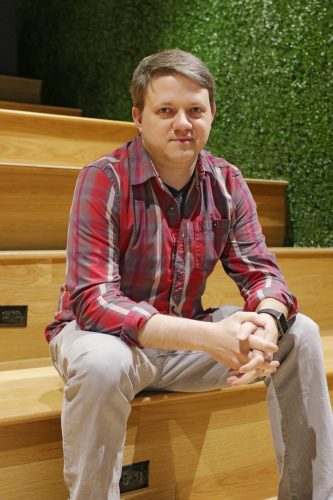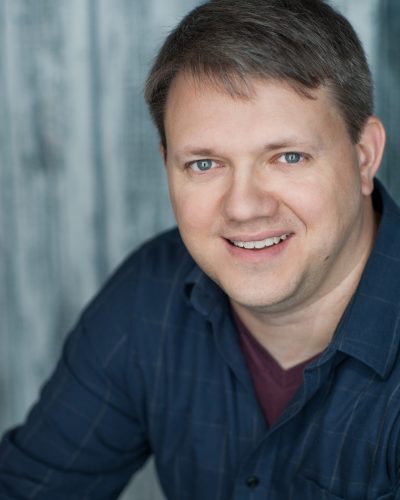A Comedian’s Advice
Matt Hovde, director at The Second City, finds success by embracing fear, empathy and the word “yes.”
A Comedian’s Advice
Matt Hovde, director at The Second City, finds success by embracing fear, empathy and the word “yes.”

Matt Hovde ’96, artistic director at The Second City Training Center and director at The Second City. Photo courtesy of Matt Hovde.
By the time he was 6, Matt Hovde ’96 knew he wanted to be a comedian. Midway through college, he knew The Second City — the world-renowned comedy club in Chicago — was his dream. He headed to the Windy City after graduation, completed Second City’s yearlong professional training program and set up his own troupe, doing comedy festivals and original shows for about four years before landing an audition with Second City. In 2003, he joined the staff to direct its touring company.
Now Hovde wears two hats: As a Second City director, he works with actors and designers to create original shows. As artistic director at The Second City Training Center, he manages teachers and curriculum for the always-growing school that teaches the art and principles of improvisation to aspiring comedians, actors, retirees, Parkinson’s patients, business-people, kids, teens and many others. Along the way, Hovde has picked up a few lessons on comedy and life:
Empathy. I think there is great wisdom in seeing the world through someone else’s eyes. While at TCU I think I was pretty self-centered as I figured out who I was and what I stood for, but my work in comedy has really helped me see the value in someone else’s point of view — it adds to my own understanding. It also allows us to find common ground. Much of comedy comes from finding truths that many people can relate to — the angst of a breakup, the frustration of calling your cable company — and then exaggerating the details.
Don’t take yourself too seriously. Passion and confidence are much more attractive qualities when tempered by reality and humor.
“Yes” is a powerful frame of mind. In improvisation, our creative ideas are hatched one tiny offer at a time — a line of dialogue, a prop, a suggestion from the audience. Improvisers learn very quickly that the quickest way to die on stage is to shut down those offers. Instead they learn to embrace and nurture them. And it turns out this very same mindset that helps us create comedy on stage can also be extremely valuable in a social or business setting. Second City does a ton of work in those areas, helping people from all backgrounds and aspirations apply improvisational techniques to their everyday lives and workplaces. We’ve used it to help Parkinson’s patients and their caregivers maintain higher levels of engagement. We’ve worked with Fortune 500 companies to develop leadership training and build branding. We’ve helped teenagers and adults who cope with anxiety practice and grow their social confidence. It’s amazing.
Embrace failure. The Wright brothers crashed prototypes before they flew at Kitty Hawk. Comedians make jokes that bomb all the time. Then we tweak them to make them better, or we revel in their wretchedness and move on. We try to keep a healthy detachment between our self-worth and the result. Failure is just a chance to learn what does or does not work. If we fear failure, we might never make the leap that allows us to reach greatness.
A mortgage is really just a loan to buy property. Maybe business students knew this already. As an actor, I did not.
Acquire new skills, even dumb ones. Since graduation, I taught myself the guitar, became a hobbyist on game theory and learned to (poorly) dice a tomato and many other mostly trivial things. The act of learning keeps us sharp and makes us more interesting. So graduate … and then take a class.
I would not enjoy being a contestant on a wilderness survival show. Too cold, too hungry, too many bugs.
Acknowledge where you came from. Our worldview is shaped dramatically by where we come from, for better or worse. This is a lesson I remember hearing from Dr. [Andrew] Fort in my world religions course at TCU, but it has become so much more relevant to me in the years since. Where we come from — our culture, the people who raise us, our peers, our teachers — shapes us and contributes to the strategies we fall back on to tackle our problems and reach our goals. This can be a great source of strength, but it can also shape our biases and habits. When we achieve something admirable, we are well served to acknowledge and thank those who helped us do so. (So thank you, Dr. Fort and [Schieffer College Professor] Richard Allen and [Associate Dean of Student Development] Kay Higgins.) But when we struggle, we might begin to overcome our challenges by asking ourselves how and why we have come to that crossroads. Seeking that understanding humbles us, but it can lead us to new strategies and improved results. I should write a pop psychology book.

Matt Hovde ’96 has picked up a few lessons on comedy and life. Photo courtesy of Matt Hovde.
Authenticity is a really big word for us these days, and it refers to this concept of being your natural self. We practice this a lot as comedians, but we also started teaching this to business clients who want their employees and management team to be more authentic. It means acknowledging where you came from, not hiding behind a script. A lot of salespeople are taught to follow a script and respond almost like a computer to certain prompts. We work a lot on how to actively listen to people and respond more intuitively to what people are saying. You’re trying to make people relate to you. Trying to be more authentic is hard to do until you have practice.
In a strange way, I found success by pretending there was no other option. As an artist, you’re not doing it for the stability. You’re doing it for the passion of it. You kind of have to be blind to the odds of success. You just have to take a leap of faith that it will work out. You keep trying to get better and take advantage of the opportunities that come your way.
There’s this thing we are working on about being OK with being challenged or uncomfortable with ideas — intellectually speaking. When the country’s dialogue is tense and filled with high emotion, it’s very easy to want to camp out in the territory that you’re comfortable in and then block out any news or information that goes against this territory you’ve carved for yourself. So we end up polarizing ourselves in these islands of self-righteousness, and we try to only satisfy or grow confirmation of our own point of view. But that doesn’t really work. It can be a real challenge to stay open-minded, and I’m encouraging our students and our artists — including myself — to stay open to growth and learning and hearing from other people.
— As told to Rachel Stowe Master
Edited for clarity and length.

Your comments are welcome
Comments
Related reading:
Alumni, Web Extras
A Career Tailor-Made for Jennifer Dasher
Jennifer Dasher ’03 has done costume design for Paula Abdul and technical rehearsals for Taylor Swift.
Alumni
Do you need a career makeover?
When was the last time you kicked the tires on your career?
Campus News: Alma Matters
Ties that bind
Senseless Acts of Comedy celebrates a dozen years of campus laughs